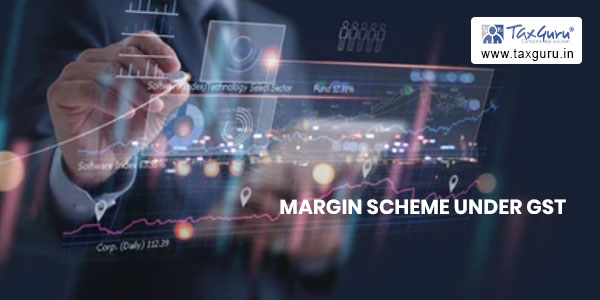Margin Scheme for Second Hand Goods under GST
Margin Scheme was introduction by way of Notification No.10/2017 dt. 28/06/2017
-Applicable for those GST registered taxpayers who deals in the purchase and sale of second-hand or used goods and makes the purchase of such goods from unregistered persons.
-Dealer will pay GST only on the margin i.e., the difference between the sale price and the purchase price of the second-hand goods
-If there is no margin or a loss, NO GST is payable in such case
-GST shall be chargeable only when such dealer resells the goods either as such or after minor refurbishing/ repairs
-Margin Scheme is applicable ONLY when there is no change or minor processing (repairing/ refurbishing) of the goods.
-If such processing changes the nature of goods, the dealer cannot opt for the ‘Margin Scheme’
Calculation of Value for Margin Scheme
- To be calculated as per Rule 32(5) of CGST Rules
- Dealer cannot avail ITC on purchase of Second Hand Goods
- Value of Second-hand goods = Selling Price – [Purchase price + Minor repairing cost]
- Purchase price of second-hand goods in case of Goods possessed after loan = Original Purchase Price of defaulting borrower- 5% depreciation for each quarter or part thereof

Example 1
CarDekho deals in buying and selling second-hand cars. It purchases a second-hand car (original price Rs. 4 Lakhs) for Rs. 2,50,000 from Mr. Ramesh (unregistered person) and sells it again to Mr. Suresh after minor repairs for Rs. 3,00,000. Suppose, repairing cost is Rs. 10,000.
- In this example, the supply of car by Mr. Ramesh to CarDekho shall not be chargeable to tax.
- Supply of car by CarDekho to Mr. Suresh will be liable for GST.
- GST will be levied on the margin earned by CarDekho.
- The margin will be derived on the basis of the difference of sale price and purchase price including repairs cost i.e., Rs. 40,000 [3,00,000 – (2,50,000 + 10,000)]
Example 2
X dealing in electronic items sold an electronic item to Mr. Y for Rs. 10 Lakhs on 01-01-2020. The electronic item is purchased by Mr. Y on an installment basis. Mr. Y defaulted in payment of EMIs on 04-09-2020 and such item was taken back by the company on 21-10-2020. The electronic item was again sold by X on 11-01-2021 at Rs. 8,10,000. Calculate GST payable by X on re-sale of such item if the GST rate is supposed 28%.
- Date of purchase by Mr. Y: 01-01-2020
- Date of Disposal by X after repossession: 11-01-2021
- Quarters or part thereof between 01-01-2020 & 11-01-2021 = 4 quarters & 11 days to be taken as 5 quarters
- Purchase Price of repossessed goods by X = Rs. 10 lakhs – (5% * 5 quarters) i.e., Rs. 7,50,000
- Margin on sale of second-hand item = 60,000 (Rs. 8,10,000- Rs. 7,50,000)
- GST Payable by X on resale of item = Rs. 60,000 * 28% = Rs. 16,800.
GST Rates on supply of second-hand vehicles
GST rates on Second Hand Vehicle have been specified via Notification No. 08/2018 dt. 25.01.2018
| Description of Goods | GST Rate |
| Old and used LPG or CNG driven motor vehicles with engine capacity of 1200 CC or more and Length of 4000 mm or more | 18% |
| Old and used Diesel driven motor vehicles with engine capacity of 1500 cc or more and Length of 4000 mm or more | 18% |
| Old and used Sports Utility Vehicle (SUVs) with engine capacity of 1500 cc or more | 18% |
| All old and used vehicles other than the above three categories | 12% |
Further Two Clarification by way of this notification came namely:
| In case a motor vehicle is sold by a registered person who has claimed depreciation u/s 32 of the Income Tax Act: | Margin = Selling price of Motor Vehicle- Depreciated value of the motor vehicle on the date of sale as per Income Tax act
If Negative, it shall be ignored |
| In any other case: | Margin = Selling Price – Purchase Price
If Negative, it shall be ignored |
GST rates on second-hand goods other than vehicles
- No difference w.r.t. Rate (whether Second Hand Goods or New Goods)
- If an article is sold @ 28%, then that article will be sold @ 18% only, even if it is Second Hand Goods
- Only Exception to this rule is Motor Vehicles Rate as mentioned in Notification 08/2018
Is input tax credit available on the purchase of second-hand goods
- If Dealer is option for Margin Scheme, he cannot opt for ITC on purchase of Second-Hand Goods
- This is one of the pre-condition for Margin Scheme as mentioned in Rule 32(5)
Cases where Second Hand Goods are sold directly by the Second Hand Goods Owner to Consumer/Buyer & Commission is charged on such sale
- In such cases, ‘Margin Scheme’ shall not apply to him
- he shall be liable to pay GST at the rate of 18% on the commission
- Threshold of 20 lakh / 10 lakh for services applicable for commission in such cases
Threshold for Registration in GST
- Threshold for Registration as per Section 22 if Aggregate Turnover exceeds 40 lakhs
- Aggregate Turnover means Aggregate Value of All Taxable Supplies, Exempt Supplies, Exports & Interstate branch transfer within same PAN
- Split opinion over this point among experts as per Rule 32(5) read with Rule 15(1)
- Opinion 1: Margin Value only
- Opinion 2: Whole Sale Amount of Car
- On a Safer side, it is better if you take Whole Sale Value amount for calculation of Threshold
Composition Scheme for Margin Scheme
- A person who is under Margin Scheme cannot opt for Composition Scheme i.e., paying Composition Tax on Margin Value
- But the dealer may opt for Normal Composition Scheme, but he has to pay GST Composition Tax on full Value of Sale amount of such Second Hand Goods
- Practically, if we see, Threshold for Composition is 1.5 Cr which may get exhausted after sale of only few 4 wheelers, also, you have to consider the margin per vehicle and the amount





